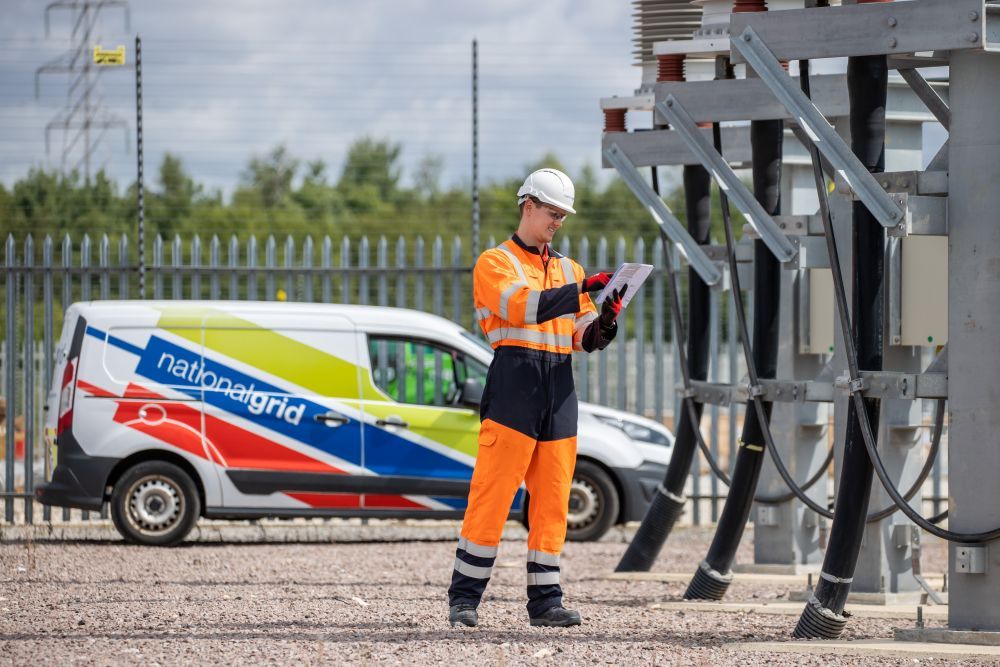Clean energy could deliver 400,000 jobs by 2030, with demand for roles including plumbers, electricians and welders, the UK Government has claimed.
It comes as the UK Government has published a comprehensive national plan to train up the next generation of clean energy workers, with employment expected to double to 860,000 by 2030.
The plan will set out clear workforce estimates for the first time, and aims for industry, the public sector, and education providers to work together to deliver one cohesive strategy to invest in training for specific in demand occupations.
For young people, the government said the jobs can offer higher levels of pay – with entry level roles in the majority of occupations in clean energy paying 23% more than the same occupations in other sectors.
Jobs in wind, nuclear, and electricity networks all advertise average salaries of over £50,000, compared to the UK average of £37,000, and are spread across coastal and post-industrial communities.
New initiatives include:
- Training up the next generation of clean energy workers – 5 new Technical Excellence Colleges will help train young people into essential roles.
- Working with Mission Renewable, the government is launching a new programme to match veterans up with careers in solar panel installation, wind turbine factories, and nuclear power stations
- Tailored schemes for ex-offenders, school leavers, and the unemployed
- Upskill existing workers – Oil and gas workers will benefit from up to £20 million in total from the UK and Scottish governments to provide bespoke careers training for thousands of new roles in clean energy.
The plan also includes proposals to ensure that jobs in the clean energy sector have good quality pay, terms and conditions.
- Closing loopholes in legislation to extend employment protections enjoyed by offshore oil and gas workers working beyond UK territorial seas, including the national minimum wage, to the clean energy sector
- A new Fair Work Charter between offshore wind developers and trade unions
- Workforce criteria in grants and procurements to test and pilot innovative ways to drive fair work and skills in DESNZ grants and contracts
It comes after the Prime Minister announced a package of reforms to elevate and transform the education skills system, with a new target for two-thirds of young people to participate in higher-level learning – academic, technical or apprenticeships – by age 25, up from 50%.
Energy Secretary Ed Miliband said:
“Communities have long been calling out for a new generation of good industrial jobs. The clean energy jobs boom can answer that call – and today we publish a landmark national plan to make it happen.”
Secretary of State for Work and Pensions Pat McFadden, said:
“We’re giving workers the skills needed for switch to clean energy, which is good for them, good for industry – and will drive growth across the nation.”
Secretary of State for Wales Jo Stevens said:
“Projects right across the country from Pembrokeshire to Flintshire are creating opportunities for hundreds of our young people and will help drive regional growth as well as accelerating our drive towards lower bills and energy security.”
Paul Nowak, General Secretary of the TUC, said:
“After years of previous governments starving British industry of investment, this represents a serious plan to start to rebuild our industrial heartlands and deliver quality jobs in clean energy – as well as supporting even more in supply chains right across the country.”
Charlotte Brumpton-Childs, National Officer at the GMB, said:
“GMB has long campaigned for a jobs first transition. The government is listening and having a jobs plan to underpin the industrial strategy is exactly what this country needs.”
Eddie Dempsey, General Secretary of the RMT, said:
“RMT welcomes the government’s commitment to closing loopholes in maritime and offshore employment law, which should in turn create domestic opportunities in coastal communities that support the entirety of the offshore wind supply chain.”
Christina McAnea, General Secretary of UNISON said:
“Clean, homegrown energy is essential in tackling climate change and delivering economic growth. This plan can help create a UK workforce with highly skilled, fairly paid and secure jobs.”
Alasdair McDiarmid, Assistant General Secretary at Community Union, said:
“The push for new clean energy jobs will also support our members in both the light industries and steel sector, with steel being an essential component for green energy infrastructure and construction.”
Sue Ferns OBE, Senior Deputy General Secretary at Prospect, said:
“The infrastructure investment required to achieve the government’s clean energy mission must be backed by a major boost to jobs and skills. If this mission is to be a success, and support the wider industrial strategy and growth agendas, then we urgently need a step-change in the level of workforce development. In this context is it welcome that this Jobs Plan now exists and the new initiatives are a welcome step in the right direction.”
Frances O’Grady, Former General Secretary of the TUC, said:
“Energy workers and their families are at the heart of this plan – showing the clean energy transition provides not just energy security but job security.”
Unite general secretary Sharon Graham said:
“Well paid, secure work must be at the heart of any green transition. Unite members will welcome the commitment to 400,000 green jobs with strong collective bargaining rights. The actions set out in this plan are initial steps in what must be an ambitious strategy for tangible jobs, backed by an equally ambitious programme of public investment.”
Chris O’Shea, Chief Executive of Centrica, said:
“We have committed to creating a new apprenticeship for every day of this decade. These new secure, skilled, well-paid jobs are key to unlocking the economic growth the UK so desperately needs.”
Keith Anderson, CEO of ScottishPower, said:
“Thanks to the clear direction set out by the government’s Clean Power 2030 Mission, we’re investing at record levels in the clean electricity infrastructure the UK needs for energy security and economic growth.”
EDF power solutions UK CEO Matthieu Hue said:
“We welcome the plan which brings clarity on the scale of the opportunity for people across the UK to work in high quality jobs which will contribute to our electric future.”
Darren Davidson, Vice President of Siemens Energy UK&I, said:
“Siemens Energy is a major employer in the UK with 6,500 workers at sites across the UK. We have taken on 140 new apprentices this autumn, and we currently have more than 200 active vacancies.”
Chris Norbury, CEO of E.ON UK, said:
“Clean power is a defining opportunity to grow the economy, strengthen energy security, and create skilled jobs that support communities nationwide. We welcome the Clean Energy Jobs Plan as a vital step towards building the workforce to realise that potential.”
Michael Lewis, CEO Uniper said:
“Uniper aims to invest approximately €8 billion into growth and transformation projects by the early 2030s, including solar and onshore wind projects, hydrogen projects, and a new combined-cycle gas turbine power station with carbon capture technology at our Connah’s Quay site – contributing to the retention and creation of jobs, and supporting the regional economy.”
Zac Richardson, Group Chief Engineer at National Grid, said:
“Secure, affordable and clean energy is essential to unlocking UK economic growth and productivity – ambitions which are underpinned by electricity networks and the unprecedented levels of planned investment in them.”
Tania Kumar, Director of Net Zero at the CBI, said:
“The growth of the clean energy economy is creating opportunities for people and places across the whole of the UK. The launch of the Clean Energy Jobs Plan offers a tangible way to connect communities with both the opportunities emerging across the sector and the businesses at the forefront of delivering them.”
Dhara Vyas, CEO of Energy UK, said:
“Today’s announcement is a critical step forward in building the workforce required to deliver our future energy system. It rightly recognises the need to tackle the skills challenge collectively by investing in both new talent and our existing workforce.”
Jane Cooper, Deputy Chief Executive at Renewable UK, said:
“The Clean Energy Jobs Plan sets out the scale of the massive opportunity which the UK has to create tens of thousands of new jobs in renewables all over the country. “
Katy Heidenreich Supply Chain and People Director at Offshore Energies UK, said:
“Investing in skills development is essential to support the UK’s energy sector and it is encouraging to see governments recognise the huge resource of our oil and gas workforce and how their skills can be developed to provide the expertise needed for the energy mix of the future.”
Claire Mack OBE, Chief Executive of Scottish Renewables, said:
“The clean power mission is not just about energy security for the country, it’s about good jobs and a workforce fit the future in your locale. The scale and importance of the energy transition requires new approaches to ensure investments in skills, apprenticeships and training serve the needs of the entire economy.”
Ben Martin, Policy Manager at the British Chambers of Commerce, said:
“The net zero economy is continuing to grow, and the Clean Energy Jobs Plan clearly sets out how the government will recruit essential workers who are critical for the UK’s energy transition. This will support both net zero and economic growth across the UK, providing certainty for people and local communities. “
Verity Davidge, Director of Policy and Public Affairs, at Make UK said:
“Manufacturers are moving at pace to invest in decarbonisation and net zero projects and the transition to clean energy offers huge opportunities for industry. To take full advantage, companies will need to have access to increasingly higher levels of skills and a talent pipeline which will fuel the growth we need to see.”
Clare Jackson, CEO of Hydrogen UK, said:
“We welcome the Clean Energy Jobs Plan’s recognition that hydrogen will be vital to net zero and to creating high-quality jobs. Much of the oil and gas workforce already has transferable skills, and supporting their transition into hydrogen will be key to a just and rapid shift to a clean energy economy.”
Olivia Powis, CEO of the Carbon Capture and Storage Association, said:
“We welcome the Clean Jobs Plan and its recognition of the vital role CCUS and hydrogen will play in achieving the UK’s growth and decarbonisation goals while keeping industries competitive. Developing the necessary skills base is crucial to unlocking these sectors’ full potential and protecting thousands of existing industrial jobs.”
Tom Greatrex, Chief Executive of the Nuclear Industry Association, said:
“This Jobs Plan shows the huge opportunity clean power offers the UK, and the vital role nuclear will play in delivering it. With 100,000 people already working in nuclear in good, skilled jobs across the country, new stations like Sizewell C and a fleet of SMRs will create thousands more — especially for young people — in clean and secure energy.”
Chris Hewett, Chief Executive, Solar Energy UK, said:
“Solar energy and battery energy storage already support over 20,000 British jobs, with expectations that the sectors will employ more than twice the number in 10 years’ time. But to reach our goals for cheaper, cleaner power, we need to redouble our efforts to attract and train staff for these fast-growing sectors. With our Solar Careers UK programme and critical support from government under the Clean Energy Jobs Plan, we have every expectation that our aspirations will be fulfilled.”
Yselkla Farmer, CEO of BEAMA, said:
“We have a long heritage of manufacturing for the electricity industry in the UK. As a supply chain at the heart of the clean energy sector we know the growth potential is substantial as we electrify our energy system. “
Lawrence Slade, CEO of Energy Networks Association, said:
“This plan is an important step towards accelerating the real economic benefits of the clean energy transition right around the country. Today network operators employ around 26,000 people and facilitate 1,500 apprenticeships, in order to maintain the safe, reliable operation of over 500,000 miles of wires and cables.”
Lieutenant General (Retd) Richard Nugee CB CVO CBE, Chair, Mission Renewable, said:
“The Clean Energy Jobs Plan reflects the valuable contributions those who have served have made and can continue to make to the nation. By linking veterans and their families with career opportunities in the clean energy sector, Mission Renewable helps companies tap into and retain skilled talent, while at the same time enabling Armed Forces communities to thrive and feel valued.”
Paul Cox, Group CEO of Energy & Utility Skills, said:
“For the government to achieve its 2030 target, we must put people at the heart of that ambition – only by having the right people with the right skills will we deliver the UK’s energy future.”
David Hughes, Chief Executive of Association of Colleges, said:
“This exciting plan will help people get the skills they need to secure good work locally and it is great to see the investment in colleges to back the government’s ambitions on a net zero future.”
Image from Shutterstock











